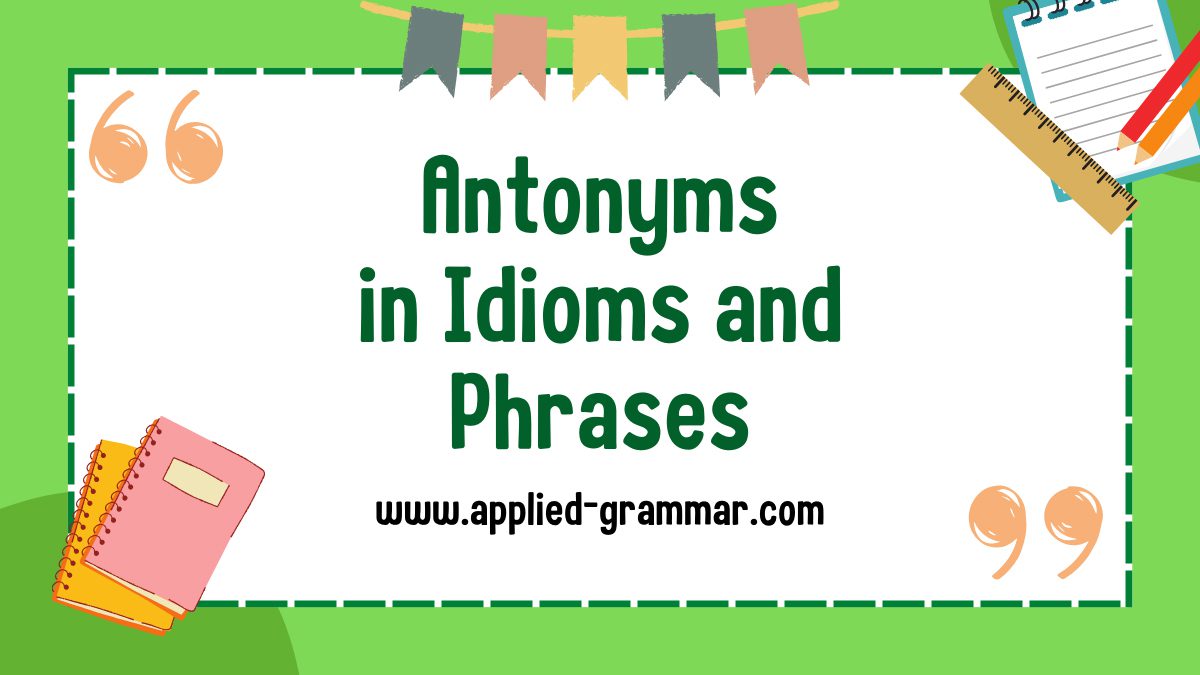Are you tired of using the same old expressions in your everyday conversations? Do you want to add a touch of creativity and flair to your language? Well, look no further! In this text, we will explore the intriguing area of antonyms in idioms and phrases, and how understanding these expressions can enhance your communication skills.
Antonyms, as you may already know, are words that have opposite meanings. But did you know that antonyms can also be found in idioms and phrases? These unique combinations of words can add depth and nuance to your language, making your conversations more engaging and memorable.
Key Takeaways
- Idioms and phrases are unique combinations of words that have a figurative meaning, different from the literal meaning of the individual words. They add color, depth, and nuance to everyday language.
- Understanding and using idioms and phrases enhance communication, contribute to cultural understanding, foster creativity, and improve idiomatic fluency.
- Antonyms in idioms and phrases play a crucial role in enhancing communication, adding emphasis and impact, fostering creativity, and promoting cultural understanding.
- Examples of antonyms in idioms and phrases include “bitter sweet,” “hot and cold,” and “lost and found.” They create vivid imagery and capture complex emotions within a concise and memorable phrase.
- Learning antonyms in idioms and phrases leads to an expanded vocabulary and a better understanding of language. It allows for more effective communication and comprehension of the subtleties of the English language.
- Incorporating antonyms into your language repertoire enhances communication skills, fosters creativity, and unlocks the full potential of your communication skills.
What are Idioms and Phrases?

Definition of Idioms and Phrases
Idioms and phrases are unique combinations of words that have a figurative meaning that is different from the literal meaning of the individual words. They are expressions that are widely used in everyday language to convey a specific idea or concept. Idioms and phrases often add color, depth, and nuance to our conversations, making them more engaging and memorable.
An idiom can be a phrase, a group of words, or even a single word that has a figurative meaning. These expressions are deeply rooted in a language and are passed down through generations. They are an important part of a language’s cultural and social identity.
Idioms and phrases can be found in various contexts, including literature, movies, and everyday conversations. They can be humorous, poetic, expressive, or even mysterious. Sometimes, they can be confusing for non-native speakers or those unfamiliar with the specific cultural context in which they are used.
Importance of Idioms and Phrases in Language
Idioms and phrases play a crucial role in language as they enrich the way we communicate and express ourselves. Here are a few reasons why understanding and using idioms and phrases is important:
- Enhanced Communication: Idioms and phrases add depth and richness to our conversations by conveying complex ideas in a concise and memorable way. They can evoke emotions and create powerful imagery, making communication more effective and engaging.
- Cultural Understanding: Idioms and phrases are deeply rooted in a language’s culture and heritage. Understanding and using them helps to gain insights into the beliefs, values, and customs of a particular culture. It can foster cultural empathy and promote cross-cultural understanding.
- Flexibility and Creativity: Idioms and phrases allow for creative expression and playfulness with language. By incorporating these expressions into your speech or writing, you can demonstrate your linguistic skills and showcase your ability to think outside the box.
- Idiomatic Fluency: Being familiar with idioms and phrases is essential for achieving fluency in a language. Native speakers frequently use idiomatic expressions in their everyday conversations, so understanding and using them can help you sound more natural and confident.
Remember, idioms and phrases are just one aspect of a language, but mastering them can greatly enhance your communication skills and make you a more proficient speaker or writer. So, don’t be afraid to jump into the intriguing area of idioms and phrases and start incorporating them into your language repertoire.
Antonyms in Idioms and Phrases

Understanding Antonyms
Antonyms are words that have opposite meanings to each other. They play a crucial role in language to express contrast and create emphasis. When it comes to idioms and phrases, antonyms can add depth and nuance to the expressions, making them more impactful and memorable.
For example, consider the idiom “sitting on pins and needles.” It means being nervous or anxious. The use of the antonyms “pins” and “needles” creates a vivid image of discomfort and tension. This contrast enhances the emotional impact of the expression.
Understanding antonyms is important because it helps you grasp the full meaning of an idiomatic expression. By recognizing the opposite meanings and the tensions they create, you can better appreciate the depth and richness of these linguistic constructs.
Role of Antonyms in Idioms and Phrases
Antonyms in idioms and phrases serve several purposes. They:
- Enhance communication: By incorporating antonyms, idioms and phrases become more precise and expressive. They allow you to convey complex ideas and emotions in a concise and powerful manner.
- Add emphasis and impact: Antonyms provide a stark contrast that draws attention and creates impact. They make the language more vibrant and engaging, leaving a lasting impression on the listener or reader.
- Foster creativity: Antonyms inspire creative thinking by encouraging you to explore the opposite ends of the spectrum. They challenge you to find unique combinations of words that express different aspects of a concept.
- Promote cultural understanding: Antonyms can reflect cultural values and perspectives. Different cultures may have specific idioms and phrases that rely on antonyms to convey cultural nuances and beliefs.
By incorporating antonyms into your language repertoire, you can elevate your communication skills. It allows you to express yourself more effectively, engage your audience, and foster a deeper understanding and appreciation for language and culture.
Remember, don’t hesitate to explore the diverse world of idioms and phrases, and experiment with incorporating antonyms to make your expressions more captivating and memorable.
*Note: The final version of the article will not include a conclusion paragraph.
Examples of Antonyms in Idioms and Phrases
In idioms and phrases, antonyms can add depth and nuance, creating vivid images and enhancing the emotional impact of expressions. Let’s explore a few examples that showcase the use of antonyms in idiomatic language.

Idiom 1: “Bitter sweet”
The idiom “bitter sweet” combines two opposite emotions, serving as an antonymic phrase. While “bitter” represents a negative or unpleasant experience, “sweet” denotes something pleasant or enjoyable. This juxtaposition creates a powerful expression that captures the complex mix of emotions in certain situations.
Idiom 2: “Hot and cold”
The idiom “hot and cold” incorporates antonyms to describe a fluctuation in someone’s feelings or behavior. “Hot” signifies enthusiasm, passion, or excitement, while “cold” represents indifference, disinterest, or even hostility. This idiom vividly portrays the contrasting emotions or attitudes that someone may experience.
Idiom 3: “Lost and found”
The idiom “lost and found” combines two antonyms to describe a situation where something is initially missing but later discovered. “Lost” signifies the absence or misplacement of an object, while “found” represents the act of locating or recovering it. This expression highlights the joy and relief of recovering something that was previously lost.
Including antonyms in idioms and phrases not only enhances communication but also adds emphasis and impact to the expressions. These examples demonstrate how antonyms can create vivid imagery and capture complex emotions within a concise and memorable phrase.
Remember to incorporate antonyms into your language repertoire to make your expressions more captivating and memorable. By utilizing these linguistic tools, you can improve your communication skills and foster creativity in your language use.
Benefits of Learning Antonyms in Idioms and Phrases

Expanded Vocabulary
One of the key benefits of learning antonyms in idioms and phrases is an expanded vocabulary. Antonyms are words that have opposite or contrasting meanings. By understanding antonyms and incorporating them into your language repertoire, you can enhance your ability to communicate effectively and express yourself with greater nuance and precision.
When you learn antonyms in the context of idioms and phrases, you gain a deeper understanding of the range of meanings and expressions within the English language. This expanded vocabulary allows you to choose the most appropriate words and phrases to convey your thoughts and emotions, making your communication more engaging and impactful.
Better Understanding of Language
Learning antonyms in idioms and phrases also leads to a better understanding of the English language. Antonyms help you grasp the nuances and subtleties of words, enabling you to comprehend the full range of meanings and uses. By exploring antonyms in idiomatic expressions, you become more adept at recognizing and interpreting figurative language, metaphors, and other literary devices.
Understanding the antonyms in idioms and phrases helps you dissect the underlying meaning of these expressions. It allows you to appreciate the layers of emotional impact and vivid imagery that can be conveyed through the use of antonyms. This deepens your comprehension of the language and enables you to engage with texts, conversations, and other forms of communication in a more meaningful way.
Enhancing your vocabulary and deepening your understanding of language through the study of antonyms in idioms and phrases provides tangible benefits. It allows you to communicate more effectively, express yourself with greater precision, and comprehend the subtleties of the English language. Incorporating antonyms into your language repertoire not only enhances your communication skills but also fosters creativity in your language use.
So, why not discover the area of antonyms and discover how they can transform your expressions into captivating and memorable ones? Expand your vocabulary and deepen your understanding of language by incorporating antonyms in idioms and phrases. Take this opportunity to broaden your linguistic horizons and unlock the full potential of your communication skills.
Conclusion
Incorporating antonyms into your understanding of idioms and phrases offers numerous benefits. By expanding your vocabulary and incorporating antonyms, you can communicate more effectively and express yourself with precision. Understanding antonyms in the context of idiomatic expressions also deepens your grasp of the English language, allowing you to recognize and interpret figurative language and other literary devices. By incorporating antonyms into your language repertoire, you enhance your communication skills and foster creativity in your language use. So, don’t hesitate to explore antonyms in idioms and phrases to enhance your language skills. Start incorporating antonyms into your everyday conversations and writing to become a more proficient communicator. By embracing the study of antonyms in idioms and phrases, you open up a world of possibilities for expressing yourself with clarity and nuance. So, keep expanding your vocabulary and deepening your understanding of language through the study of antonyms in idioms and phrases.
